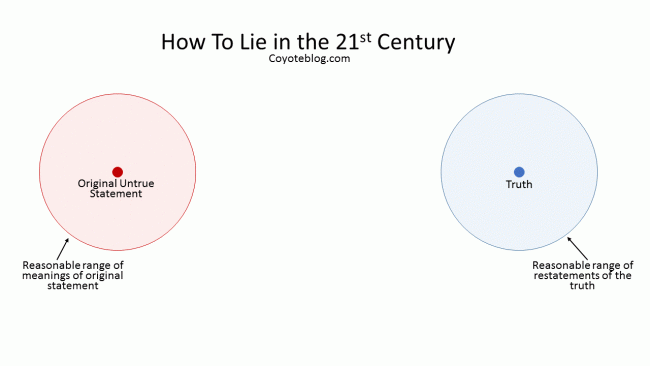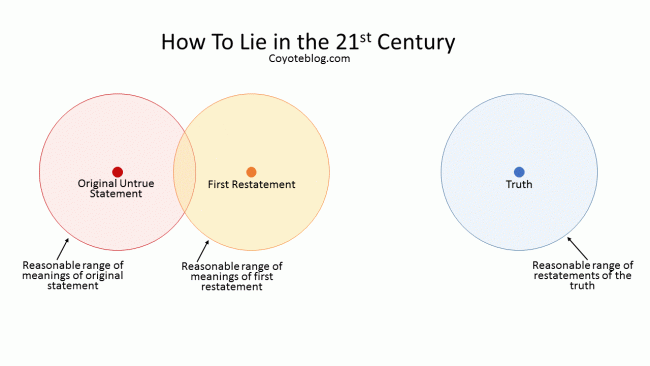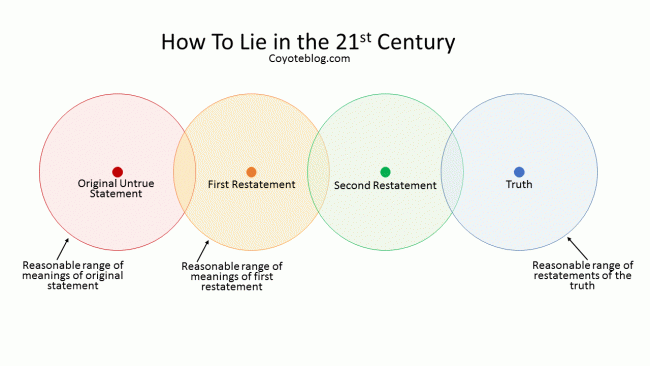Coyote's first rule of government authority: Never support any government power you would not want your ideological enemy wielding
I often wonder if Democrats really believe they will hold the White House forever. I suppose they must, because they seem utterly unconcerned, even gleeful in fact, about new authoritarian Presidential powers they would freak out over if a Republican exercised.
Coyote's first rule of government authority: Never support any government power you would not want your ideological enemy wielding.
In December 2007 presidential candidate Barack Obama told The Boston Globe that if he won the 2008 election, he would enter the White House committed to rolling back the sort of overreaching executive power that had characterized the presidency of George W. Bush. "The President is not above the law," Obama insisted.
Once elected, however, President Obama began to sing a different sort of tune. "We're not just going to be waiting for legislation," Obama announced. "I've got a pen and I've got a phone...and I can use that pen to sign executive orders and take executive actions and administrative actions."...
To make matters worse, many of Obama's fervent liberal supporters pretended to see nothing wrong with such obvious abuses of executive power. For example, consider the behavior of the prestigious editorial board of The New York Times. Back in 2006, when George W. Bush had the reins, the Times published an unsigned editorial lambasting Bush for his "grandiose vision of executive power" and his foul scheme to sidestep the Senate and unilaterally install his nominees in high office. "Seizing the opportunity presented by the Congressional holiday break," the Times complained, "Mr. Bush announced 17 recess appointments—a constitutional gimmick."
But guess what the Times had to say a few years later when President Obama had the reins and he utilized the exact same gimmick? "Mr. Obama was entirely justified in using his executive power to keep federal agencies operating," the Times declared in defense of Obama's three illegal appointments to the National Labor Relations Board. (Those three NLRB appointments, incidentally, were ruled unconstitutional by a 9-0 Supreme Court.)
I remember a conversation with my mother-in-law, who is a fairly accurate gauge of New England Left-liberal thought. She was absolutely adamant that the Republican Congress, from the very beginning, had dug in and refused to work with Obama and that the resulting gridlock gave Obama the absolute right to work around Congress and govern by fiat. I remember asking her, are you comfortable giving President Lindsey Graham that power too? (Trump was not even a glimmer in the eye of the body politic at that point so Graham was the best Republican bogeyman I could think up on short notice). I don't remember an answer to this, which reinforced the sense I had at the time that Democrats honestly did not think they would lose the White House in their lifetimes -- I suppose they thought that 8 years of Obama would be followed by 8 years of Clinton.
Well, the freak out is officially here and I will happily embrace all Democrats who want to make common cause in limiting Presidential power.
Coyote's first rule of government authority: Never support any government power you would not want your ideological enemy wielding @reason
— Coyoteblog (@Coyoteblog) November 14, 2016
Update: Glenn Greenwald makes many of the same points
Sen. Barack Obama certainly saw it that way when he first ran for president in 2008. Limiting executive-power abuses and protecting civil liberties were central themes of his campaign. The former law professor repeatedly railed against the Bush-Cheney template of vesting the president with unchecked authorities in the name of fighting terrorism or achieving other policy objectives. “This administration also puts forward a false choice between the liberties we cherish and the security we provide,†he said in 2007. Listing an array of controversial Bush-Cheney policies, from warrantless domestic surveillance to due-process-free investigations and imprisonment, he vowed: “We will again set an example for the world that the law is not subject to the whims of stubborn rulers.â€
Yet, beginning in his first month in office and continuing through today, Obama not only continued many of the most extreme executive-power policies he once condemned, but in many cases strengthened and extended them. His administration detained terrorism suspects without due process, proposed new frameworks to keep them locked up without trial, targeted thousands of individuals (including a U.S. citizen) for execution by drone, invoked secrecy doctrines to shield torture and eavesdropping programs from judicial review, and covertly expanded the nation’s mass electronic surveillance.
Blinded by the belief that Obama was too benevolent and benign to abuse his office, and drowning in partisan loyalties at the expense of political principles, Democrats consecrated this framework with their acquiescence and, often, their explicit approval. This is the unrestrained set of powers Trump will inherit. The president-elect frightens them, so they are now alarmed. But if they want to know whom to blame, they should look in the mirror.



